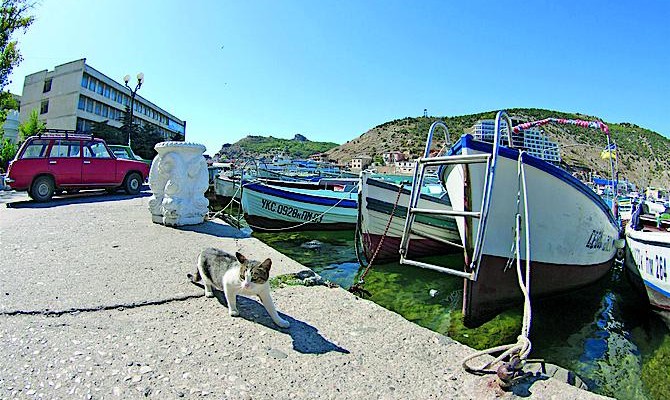Business
trendsThe mechanism proposed for registration of real estate in Crimea is a godsend and a gold mine for swindlers

Several months following the annexation of Crimea by Russia local authorities managed to de-freeze the real estate market. Last Friday, two republican centers for the registration of ownership rights for real estate in the system of the State Register of Russia started accepting documents on the territory of the peninsula. “Starting from August 15, Crimeans will be able to conduct transactions with their real estate: sell, pledge, etc,” stated Acting Head of the Republic Sergey Aksyonov at a meeting of the Council of Ministers of Crimea.
For registration of a transaction an applicant must submit copies of a deed and a technical certificate to the State Committee for State Registration and Cadastre of Crimea (SCSRCC) and within 18-22 days receive documents confirming ownership rights under the Russian law. Then, the transaction must be registered with a notary public and then again submitted to the SCSRCC.
Market is booming
Real estate registration transactions were suspended in the beginning of March, when the peninsula was actively preparing for the referendum, as Capital wrote earlier. After the referendum, it was impossible to officially register a deal, but despite this, the market saw a major hype. In April-May, Crimean realtors registered a two-threefold increase in the demand for real estate compared with the same period of the previous year. “Buyers signed preliminary agreements and made down payments. Some did not even register their down payment agreements,” says leading real estate specialist at the Crimean development company SoyuzStroyTekhnologiya Valeriya Petrusevich.
The buyers were Russians from all regions of the country. Around 30% of the transactions were of an investment nature. Director of the Crimean agency NTN Dmitri Mayorov says housing intended for leasing was acquired not only on the Southern Coast of Crimea, but also in Simferopol. Starting from May a large number of businessmen and employees of Russian companies that rent housing arrived to the capital of the autonomous republic, he added. “At the moment, it is very difficult to find an apartment for rent,” he notes.
As a result, Mayorov says from March until July the rent increased by 30%. At the moment, the cheapest one-room apartment in Simferopol is offered for US $300 per month and in a respectable district – US $450-500 per month.
The hyped demand spurred a rise in housing prices. In April-May, the prices on the primary market increased by 30% and on the Southern Coast of Crimea – by 50%, said Petrusevich. At the moment, real estate in Yalta is offered for US 2,500-3,500 per square meter. “The prices on the secondary market did not change as the majority of buyers look at newly constructed buildings,” she added. The average price of an apartment in an old building on the Southern Coast of Crimea is currently around US $2,000 per square meter, according to Yalta-City.
Prices are stabilizing
The mechanism proposed for registration of transactions is far from perfect and has many loopholes for swindling, experts asked by Capital assure. The Ukrainian Registry in which real estate transactions are registered, has not been used on the territory of Crimea since the spring, while the Russian register is empty. In the spring, Aksyonov promised to restore the data for transactions in Crimea over the period 2013 to 2014, but, as the publication was told at the State Registration Service of Ukraine (SRSU), Ukrainian officials have not conveyed this information to the peninsula. It is only possible to trace the history of a real estate object by documents up until January 2013. As a reminder, the electronic register was then introduced in Ukraine, while Technical Inventory Bureaus were abolished. This means that there is no guarantee that a buyer purchases an apartment from the current legal owner and not the former owner and also that the apartment is not used as a pledge.
In addition to that, one and the same apartment or a house can be sold twice: by Russian and Ukrainian law. As Capital wrote earlier, the law on occupied territories envisages the possibility of registration of Crimean real estate in offices of the SRSU located on the mainland. However, since the data on such transactions will not be registered in the Russian register, the same real estate can be sold to another buyer. A partner at the Ilyashev & Partners law firm Maksym Kopeychykov adds that in the event that Crimea is returned to Ukraine, all transactions performed under Russian law will be declared null and void.
All these factors are holding back the further increase in the number of transactions for Crimean apartments and houses, says a specialist of the Yalta-City real estate agency, who wished to remain anonymous. “At the moment, the demand for housing remains at the same level as last year. Everybody who wanted to purchase housing already signed purchase/sale agreements,” agrees Petrusevich. She specifies, however, that buyers are driven away not only by the imperfect system of registration, but also by high prices. “Today, real estate has become expensive for many Russians as well. The prices will not grow further,” she concludes.






 of the agreement of syndication with Financial Times Limited are strictly prohibited. Use of materials which refers to France-Presse, Reuters, Interfax-Ukraine, Ukrainian News, UNIAN agencies is strictly prohibited. Materials marked
of the agreement of syndication with Financial Times Limited are strictly prohibited. Use of materials which refers to France-Presse, Reuters, Interfax-Ukraine, Ukrainian News, UNIAN agencies is strictly prohibited. Materials marked  are published as advertisements.
are published as advertisements.